charles matthews please do everything
 SPONSOR NOTE. HomeSure Lending is once again sponsoring our NCAA Tournament coverage this year, and once again that is going rather well. I'm not saying Michigan's second run to the FINAL FOUR is due to this great partnership of sports blog and home-financing expert; I'm not saying it isn't, either. I certainly don't want to test this theory. If you're looking at buying a house this spring/summer you should talk to him soon.
SPONSOR NOTE. HomeSure Lending is once again sponsoring our NCAA Tournament coverage this year, and once again that is going rather well. I'm not saying Michigan's second run to the FINAL FOUR is due to this great partnership of sports blog and home-financing expert; I'm not saying it isn't, either. I certainly don't want to test this theory. If you're looking at buying a house this spring/summer you should talk to him soon.
ICYMI. Tuesday's mailbag covered Moe Wagner's impact on opponent strategy, the John Beilein inbounding myth, and an interesting hypothetical about Beilein as an NBA coach. Wednesday's covered Loyola matchups, small ball, Jon Teske, and why Z keeps getting robbed (off the court). Brian posted the Loyola Chicago preview yesterday.
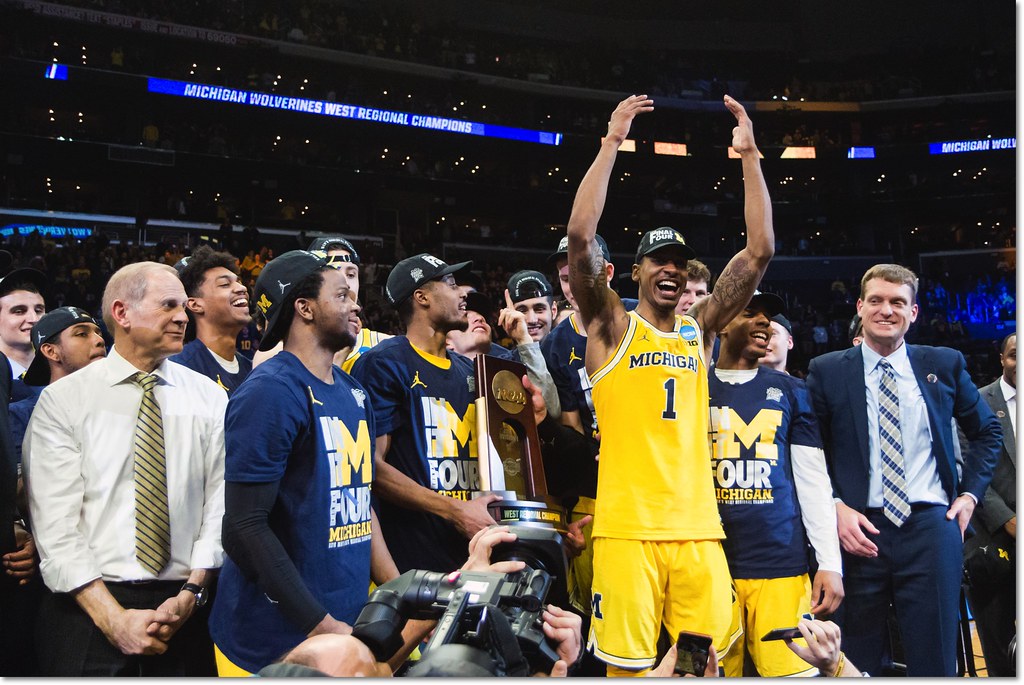
Up, then down, then very up. [Patrick Barron]
I was going to write another mailbag today but I'm past the point of rational thought. I should've seen this coming. This team, all season, has bucked expectation seemingly every time they settled into a pattern.
Heading into the season, this was going to be Moe Wagner's team. Or maybe Jaaron Simmons' if his MAC stardom translated, which we quickly learned did not. Perhaps Charles Matthews would fulfill his obvious potential and run the show, which appeared to be the case in November. Then he reverted to Turnover Matthews, the player we belatedly learned had been present for much of his mandated redshirt year, and we hoped he'd give up on being the centerpiece. He did, until the team needed a hard-driving centerpiece in the NCAA Tournament and he won West Region MVP.
Zavier Simpson started the first four games before coming off the bench in favor of Eli Brooks for the next 12. I wrote this on December 6th when exploring potential season outcomes:
For as good as Darius Morris was a sophomore, he simply wasn't ready for a starter's role as a freshman. Despite major differences in stature, Morris's statistical profile wasn't too different from Zavier Simpson's: very low usage, higher turnover rate than assist rate, awful outside shooting. (I know Simpson has shot okay from three this year but opponents are leaving him all alone out there and it's killing spacing.) Morris needed a full year before he was ready to run an efficient offense; if this year's PGs need a similar timetable, Michigan is probably missing the tournament.
I concluded that Brooks would do enough to help the Wolverines make the tourney as a bubble team. My personal Zavier Simpson mea culpa tour started eight days later.
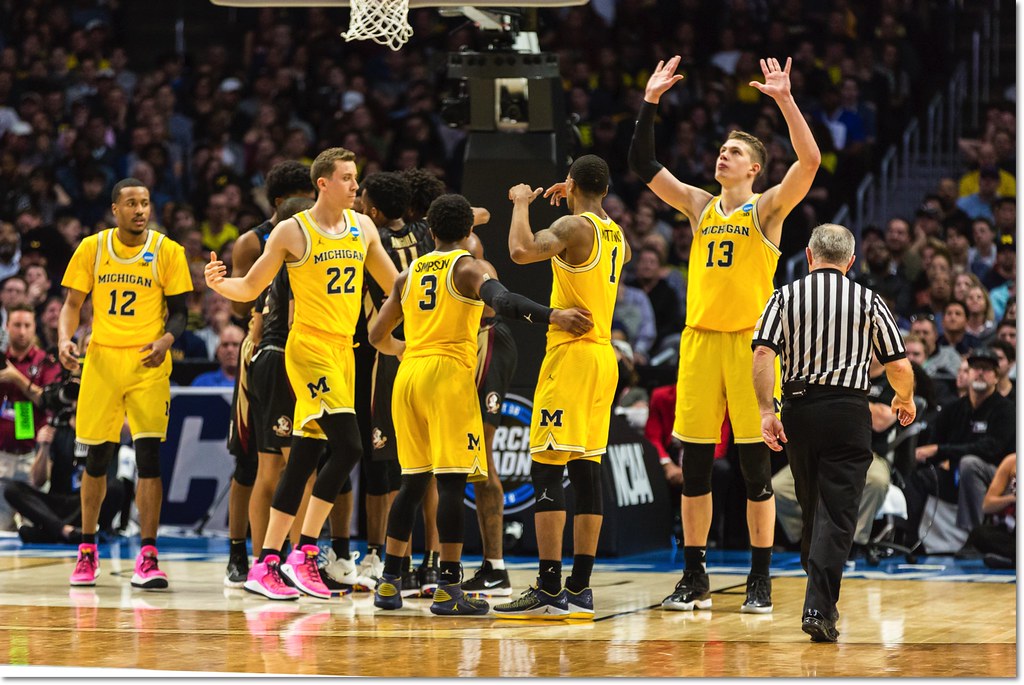
The core. [Barron]
Duncan Robinson, a senior captain, had his starting job taken by a younger player for the second consecutive season, this time while mired in a shockingly uncharacteristic shooting funk. He continued to be a liability on defense until, suddenly, he no longer was that at all, through some combination of dogged work paying off and Luke Yaklich's tactical wizardry. While he stayed out of the starting lineup, he's one of the best five with commensurate playing time, and the team is evidently unbeatable when he scores six or more points.
The other returning senior, Muhammad-Ali Abdur-Rahkman, looked like the effective role player he'd pretty much always been for much of the year. When Michigan needed someone to grab control as Matthews struggled, however, he took the wheel.
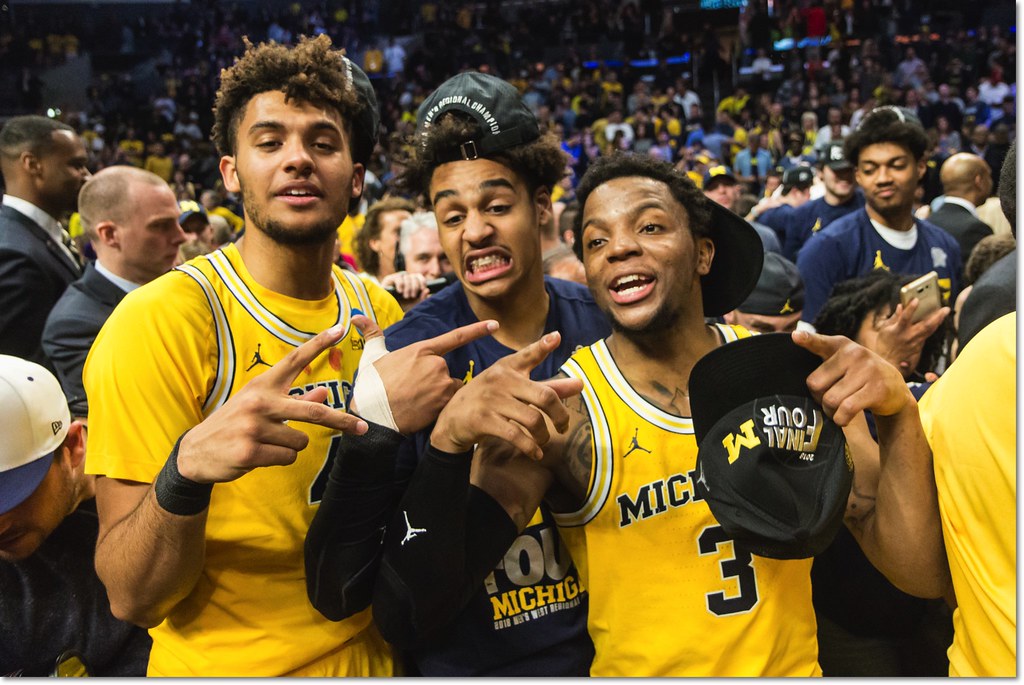
Rolling with it. [Barron]
Talented freshmen Isaiah Livers and Jordan Poole had to deal with the considerable learning curve of John Beilein's system plus a newfound emphasis on defensive fundamentals that'd make it much harder for the average freshman to make a quick impact. Both marinated for a while before the blowout loss at North Carolina provided them with extended minutes against real competition. They settled into roles; those roles changed; they adapted, often by the day. Poole went from playing season-saving microwave against Houston to two statless minutes against Florida State.
Jon Teske earned the nickname "Big Sleep" as a freshman in large part due to how completely out-to-lunch he looked on the court. Some offseason chatter had him losing ground to a different big, Austin "Big Country" Davis, who'd redshirted behind Teske last year. Teske held off Davis and had a strong start to the season, using his size to overwhelm lesser opponents, before his production faded when conference play began in earnest. Sometime around Valentine's Day, "Big Nasty" awoke, and this big guy screams at Isaac Haas after dunking in his grill.
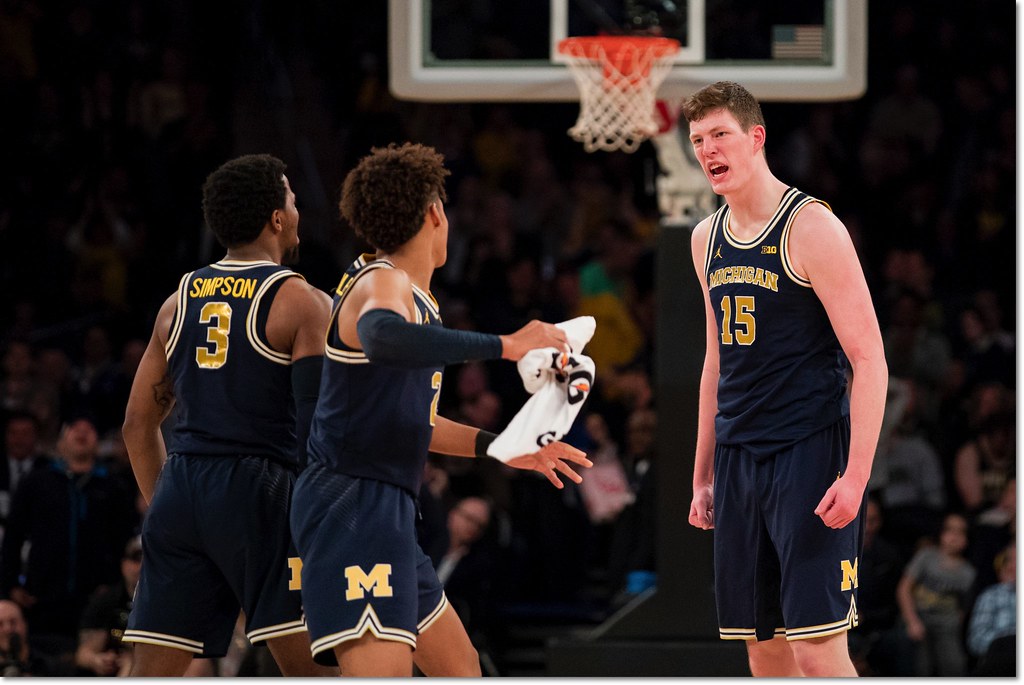
Hello, Big Nasty. [Marc-Gregor Campredon]
The last time Michigan made it here, the circumstances could hardly have been more different. While the 2012-13 team had lost Stu Douglass and Zack Novak from the starting lineup, every other contributor returned save Evan Smotrycz. The team had a clear leader in Trey Burke, a clear second option in Tim Hardaway Jr., an experienced big man in Jordan Morgan, and a group of prodigious freshmen that quickly settled into well-defined roles. The only significant change in how the team functioned throughout the season was Mitch McGary's postseason breakout, which wasn't too difficult to see coming.
This team isn't like that, not one bit. They play great defense no matter who is on the floor and squeeze enough offense out of their collection of misfit toys to grind out wins. Occasionally it all comes together and they blow a team to bits; more often, it's a matter of waiting to see how the game will dictate which player ultimately takes the lead. Not many teams make it this far in such fashion. For your college-to-pro comparison, you don't need to look far: hello, 2003-04 Detroit Pistons.
Will it end the same way? We'll see. Which player will take the lead? Who knows. Will it matter? I have no idea.
Neither does John Beilein, I'm guessing, but he has a much better plan of how to handle that. If you need me, I'll be curled up in a ball of anticipation.

Champions of the West. [Patrick Barron/MGoBlog]
Say it again, Dana Jacobson. Say it again and again, everyone.
Michigan is going to the Final Four. John Beilein, the true king of Ann Arbor, is one victory—against, of all teams, 11-seed Loyola—away from his second championship game in six years and an opportunity for the program's first national title since 1989.
The Wolverines got there in a most un-Beilein way. This was not Thursday, when they rained fire on Texas A&M. This is what many fans feared Thursday would look like, as a very large, athletic Florida State squad held Michigan well under a point per possession. Michigan, meanwhile, couldn't hit a three-pointer, going an appalling 4-for-22 from beyond the arc. Any past Beilein team would've lost this game.
But not this one. For as good as FSU's defense played, Michigan's was a cut above. The Seminoles had one more field goal (16) than turnovers committed (15). They kept a transition-reliant FSU scoreless on fast breaks; the Wolverines scored 12 in transition because of live-ball turnovers. That, above all, made the difference in a game featuring great halfcourt defense and ugly shooting.
"I've never seen a team work so hard and be so connected on both ends of the floor, even when things do not go right on the offensive end," said Beilein. "They were exceptional on defense. We had that string of plays where Moe was wide open, Charles is wide open, Duncan was wide open, and they didn't go down and sulk at the other end. They ended up just playing better defense so that we could win the game."
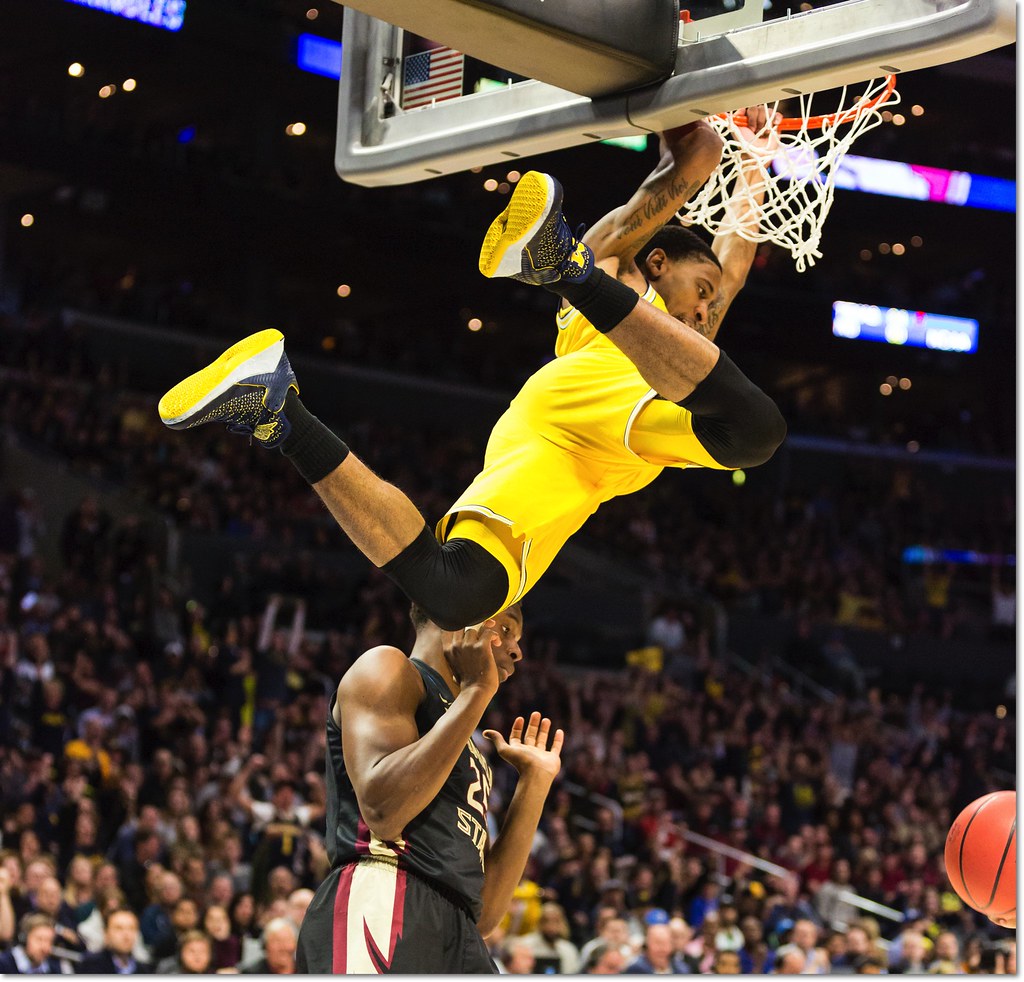
Charles Matthews surprised a lot of people tonight. [Barron]
Michigan's heroes weren't the ones you would've expected a month or two ago. Charles Matthews scored M's first points on an and-one dunk, flashed a rare smile, and proceeded to carry the offense through some truly ugly stretches. Using strong drives, sharp pivots, and tough finishes, Matthews finished with a game-high 17 points, eight rebounds, two blocks, a steal, and only one turnover.
"It was special," he said. "Last year all I used to hear in practice was turnover Matthews, turnover Matthews. And go see 212, that's when I have to run up to the top of the bleachers. But I stayed with it. Coach stayed on me. He continued to believe in me, and that continued to help my confidence grow. My teammates believe in me, and I believe in them. So it's just been a special feeling."
Zavier Simpson set the tone early, as well, when he ripped the ball away from FSU's Terance Mann as a parent would take a toy from an unruly child. While the stat line is packed—nine points on 4/8 shooting, three boards, five assists, one turnover, three steals—it doesn't do justice to Simpson's masterful control over the game. On a normal Michigan shooting night, Simpson threatens double-digit assists. Meanwhile, he hit a couple huge shots late and played his usual superlative defense. The two Seminole point guards, Trent Forrest and CJ Walker, combined to go 1-for-9 from the field with five turnovers.
Nobody else, though, could find any consistency on offense. Moe Wagner had an especially brutal outing, failing to hit a field goal in the first half before finishing with 11 points on 15 shot equivalents. Muhammad-Ali Abdur-Rahkman needed ten shot equivalents to net his nine points. Duncan Robinson didn't make his first three-pointer until 2:25 remained, when his corner triple gave the Wolverines a seemingly insurmountable ten-point lead.
Florida State nearly surmounted it. Free throws, that familiar bugaboo, nearly cost Michigan dearly this time, as Simpson and MAAR went on a 2-for-5 stretch that included missing the front end of two one-and-ones to allow FSU to pull within a single possession twice. After Phil Cofer's putback got the 'Noles cut the margin to two, however, Robinson calmly sunk two free throws. PJ Savoy missed a wild, contested three-pointer with 13 seconds to play, Robinson grabbed the rebound, and for reasons unbeknownst to everyone other than Leonard Hamilton, Robinson was allowed to dribble out the clock.
"We knew they were going to make a run," said Abdur-Rahkman. "We each had to weather the storm and get stops when we needed it. And I think that's what we did."
Michigan is going to the Final Four—say it again—because they got stops. What a team. What a coaching staff. What a world.
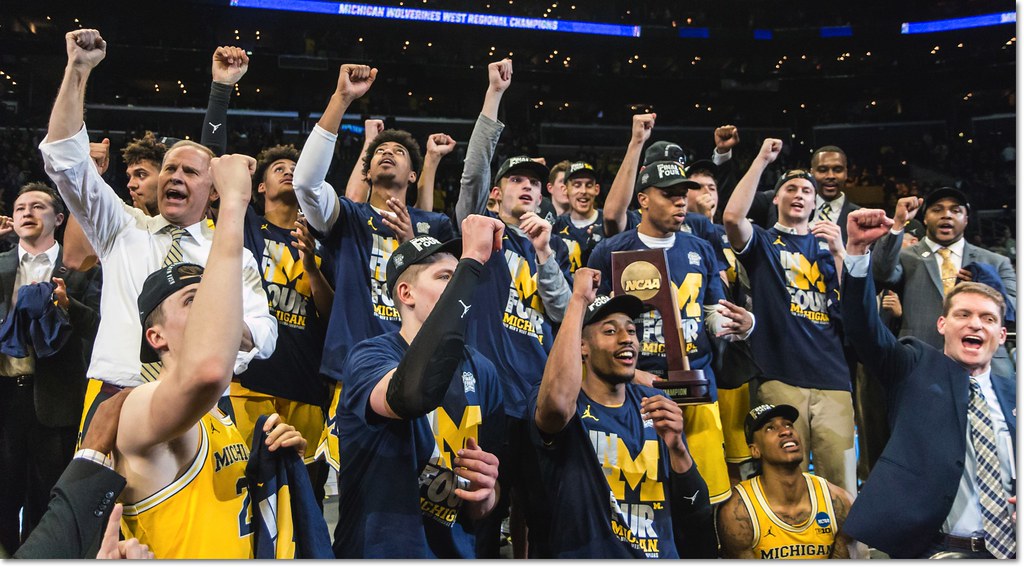
[Hit THE JUMP for more photos and the box score.]
If you're looking for the UNC preview, click here or scroll down.
Charles Matthews, Point Guard
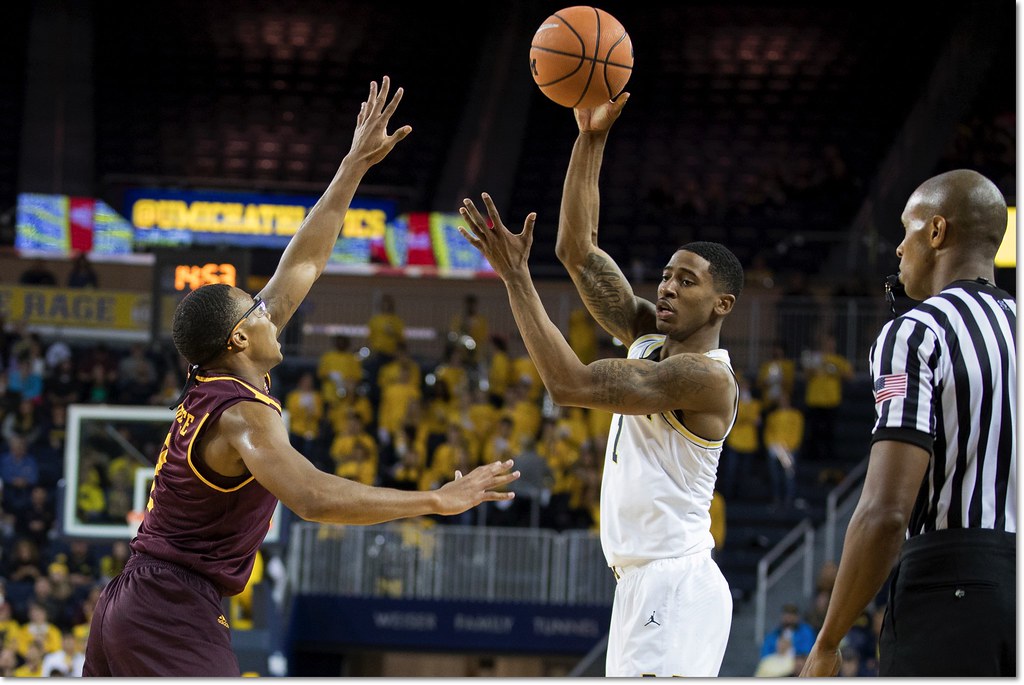
No point guard? Just run the offense through the wing. [Marc-Gregor Campredon]
Charles Matthews was nothing short of spectacular in the Maui Invitational. The only thing that could slow him down was cramps, which hit in the third game in three days after Matthews had posted back-to-back 20+ point, 8+ rebound, 3+ assist games.
If anything, those numbers undersell Matthews's impact. This offense now runs through him, much like the 2014 team's went through Nik Stauskas while the team broke in a freshman point guard. In the loss to LSU, Matthews took on 40% of the team's possessions with remarkable efficiency: 28 points on 22 shot equivalents, six offensive rebounds, three assists, and only two turnovers. While the final result may not have been desirable, Michigan established their offensive identity in this game. Once again, the two-man game with Moe Wagner will be the centerpiece of the offense, this time with Matthews running the show.
Early on, Michigan used a side screen to get Matthews going left-to-right into the paint, where he could either pull up for a short jumper or dump it off to Wagner for a jumper:
Like the Walton-Wagner duo, the two showed an innate ability to read the defense and make the right play off the screen, whether originating at the top of the key or off to the side. Matthews found Wagner with a nifty lob on the roll to set up an and-one; Wagner flipped a high screen to get a wide open jumper; when the roll wasn't open, Wagner cleared out so Matthews could isolate his defender and draw a shooting foul off the drive; when Wagner popped out for a three-point attempt, Matthews crashed the boards and cashed in with a putback.
What's been most impressive, and pleasantly surprising, is Matthews's court vision and passing out of the pick-and-roll. According to Synergy, Michigan ranks in the 88th percentile in pick-and-roll derived offense when Matthews is the ballhander, and he's currently providing more value as a passer (87th percentile) than a finisher (69th). This play jumped out to me the most from last week. Wagner slips the initial screen as VCU aggressively doubles Matthews. When the defender in the corner slides down to prevent a Wagner layup opportunity, Matthews throws a really difficult pass to Duncan Robinson over the double:
If that pass is late or even a bit off-target, VCU can recover to contest Robinson's shot. Instead, it's an easy three points because Matthews puts it right on him.
[Hit THE JUMP for the Matthews-Wagner off-ball two-man game and more.]
30